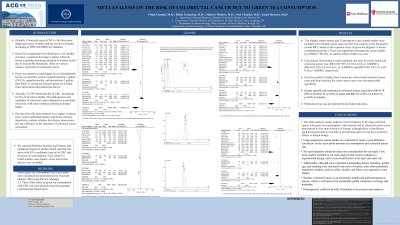Sunday Poster Session
Category: Colorectal Cancer Prevention
P0362 - Meta-Analysis on the Risk of Colorectal Cancer Due to Green Tea Consumption
Sunday, October 22, 2023
3:30 PM - 7:00 PM PT
Location: Exhibit Hall

Has Audio

Vishal Chandel, MD
Suburban Community Hospital
Feasterville-Trevose, PA
Presenting Author(s)
Vishal Chandel, MD1, Robin Zachariah, MD2, Mathew Mathew, MD3, Neel Chandel, MD4, Emad Mansoor, MD5
1Suburban Community Hospital, Feasterville-Trevose, PA; 2Duke University Hospital, Durham, NC; 3Suburban Community Hospital, Media, PA; 4St. Mary Medical Center, Feasterville-tTevose, PA; 5Case Western Reserve University / University Hospitals, Cleveland, OH
Introduction: Globally, Colorectal cancer (CRC) is the third most diagnosed cancer in males and the second in females, according to WHO GLOBOCAN database. Green Tea (originating from dried leaves of Camellia sinensis), a common beverage in Japan, China & Korea is gaining increasing attention in western world due to its possible therapeutic effect on various cancers, especially on colorectal cancer. Green tea contains a much higher level of polyphenols known as catechins, such as epigallocatechin-3 gallate (EGCG), epigallocatechin, and epicatechin-3 gallate than black or oolong tea, because green tea is made from unfermented unoxidized tea leaves. The pathogenesis and morbidity of colorectal cancer depends on a multitude of factors, with some evidence pointing to dietary habits. Our aim from this meta-analysis is to capture evidence from various published studies worldwide and then, objectively evaluate whether this dietary intervention has any influence on the outcomes of colorectal cancer prevention.
Methods: We searched PubMed, Medline and Embase and included prospective studies which reported risk ratios with 95% confidence interval. Summary odds ratio (ORs) for highest versus lowest green tea consumption levels were calculated based on fixed and random effect models. Meta-regression and stratified methods were used to examine heterogeneity across studies.
Results: Ten eligible cohort studies and 15 prospective case control studies were included with 198,488 cancer cases and 581,556 controls. From the pooled overall RR’s, based on the exposure levels of green tea (highest vs lowest consumption per day). There was significant heterogeneity across studies (p=0.0002,I2=88.2%), so random effects model was used. Calculations showed that overall combined risk ratio for colon, rectal and colorectal cancer was (RR=0.05, 95% CI: 0.01-0.18, p< 0.000001); (RR=0.02 95% CI: 0.01-0.11, p< 0.000001) and (RR=0.08, 95% CI: 0.02-0.30, p< 0.00001) respectively. Only the results of studies from Europe for colon/rectal/colorectal cancer cases and from America for colon cancer cases were not statistically significant. Publication bias was not detected by the funnel plot tests.
Discussion: This meta-analysis results indicate a lower tendency to develop colorectal cancer with green tea consumption, with reduced risk of colorectal cancer more pronounced in Asia than America or Europe, although there is insufficient epidemiological data to conclude at present that green tea can have protective effects in human-beings.

Disclosures:
Vishal Chandel, MD1, Robin Zachariah, MD2, Mathew Mathew, MD3, Neel Chandel, MD4, Emad Mansoor, MD5. P0362 - Meta-Analysis on the Risk of Colorectal Cancer Due to Green Tea Consumption, ACG 2023 Annual Scientific Meeting Abstracts. Vancouver, BC, Canada: American College of Gastroenterology.
1Suburban Community Hospital, Feasterville-Trevose, PA; 2Duke University Hospital, Durham, NC; 3Suburban Community Hospital, Media, PA; 4St. Mary Medical Center, Feasterville-tTevose, PA; 5Case Western Reserve University / University Hospitals, Cleveland, OH
Introduction: Globally, Colorectal cancer (CRC) is the third most diagnosed cancer in males and the second in females, according to WHO GLOBOCAN database. Green Tea (originating from dried leaves of Camellia sinensis), a common beverage in Japan, China & Korea is gaining increasing attention in western world due to its possible therapeutic effect on various cancers, especially on colorectal cancer. Green tea contains a much higher level of polyphenols known as catechins, such as epigallocatechin-3 gallate (EGCG), epigallocatechin, and epicatechin-3 gallate than black or oolong tea, because green tea is made from unfermented unoxidized tea leaves. The pathogenesis and morbidity of colorectal cancer depends on a multitude of factors, with some evidence pointing to dietary habits. Our aim from this meta-analysis is to capture evidence from various published studies worldwide and then, objectively evaluate whether this dietary intervention has any influence on the outcomes of colorectal cancer prevention.
Methods: We searched PubMed, Medline and Embase and included prospective studies which reported risk ratios with 95% confidence interval. Summary odds ratio (ORs) for highest versus lowest green tea consumption levels were calculated based on fixed and random effect models. Meta-regression and stratified methods were used to examine heterogeneity across studies.
Results: Ten eligible cohort studies and 15 prospective case control studies were included with 198,488 cancer cases and 581,556 controls. From the pooled overall RR’s, based on the exposure levels of green tea (highest vs lowest consumption per day). There was significant heterogeneity across studies (p=0.0002,I2=88.2%), so random effects model was used. Calculations showed that overall combined risk ratio for colon, rectal and colorectal cancer was (RR=0.05, 95% CI: 0.01-0.18, p< 0.000001); (RR=0.02 95% CI: 0.01-0.11, p< 0.000001) and (RR=0.08, 95% CI: 0.02-0.30, p< 0.00001) respectively. Only the results of studies from Europe for colon/rectal/colorectal cancer cases and from America for colon cancer cases were not statistically significant. Publication bias was not detected by the funnel plot tests.
Discussion: This meta-analysis results indicate a lower tendency to develop colorectal cancer with green tea consumption, with reduced risk of colorectal cancer more pronounced in Asia than America or Europe, although there is insufficient epidemiological data to conclude at present that green tea can have protective effects in human-beings.

Figure: 'Risk estimates' of green tea consumption with colon/rectal/colorectal cancer risk based on geographical location and cancer site
Disclosures:
Vishal Chandel indicated no relevant financial relationships.
Robin Zachariah indicated no relevant financial relationships.
Mathew Mathew indicated no relevant financial relationships.
Neel Chandel indicated no relevant financial relationships.
Emad Mansoor indicated no relevant financial relationships.
Vishal Chandel, MD1, Robin Zachariah, MD2, Mathew Mathew, MD3, Neel Chandel, MD4, Emad Mansoor, MD5. P0362 - Meta-Analysis on the Risk of Colorectal Cancer Due to Green Tea Consumption, ACG 2023 Annual Scientific Meeting Abstracts. Vancouver, BC, Canada: American College of Gastroenterology.
